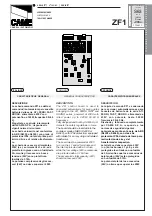
SLOW-FAST Control Parameters
SMART MATRIX QUILT
3 - 11
Operation Principle of SMART MATRIX QUILT and PRX Signal
Management.
The SMART MATRIX QUILT System allows you to control the yarn tension during the stitching operation,
using as reference two different sets of parameters which reflect the status of your quilting machine (
SLOW
EXT
= machine running at low speed or at the initial ramp stage;
FAST EXT
= machine running at high
speed, or at normal speed after the initial ramp stage).
The actual control, however, is carried out only while the system receives the PRX signal (i.e. during the
actual operation of the stitching needles).
At system installation time, you must then pay particular attention to the following points:
1) Make sure that your machine is capable of providing a signal related to the needle activation and
connect such signal to the PRX EXT signal of the SM-DIN QUILT Board.
2) Check whether your machine is capable of providing two distinct signals related to the operating
status (low/high/speed) of the machine itself. If this is the case, then connect the two signals to the
SLOW EXT
and
FAST EXT
inputs of the SM-DIN QUILT Boards.
3) Is your machine does not provide two distinct signals (
SLOW
/
FAST
), but it can provide in any case
a “Start” signal, this can be connected to both inputs (
SLOW EXT
and
FAST EXT
) of the SM-DIN
QUILT Boards, and you must define the two states (
SLOW
= initial ramp and
FAST
= nominal
speed) through the parameters
DELAY SLOW
and
DELAY FAST
, as indicated on previous section:
SLOW-FAST
Control Parameters.
As an alternative, you may simulate the
SLOW
and
FAST
states, using the PRX signal as timing
element.
Notes about the style parameters programming (
STYLE EDIT
menu)
If the PRX pulses are too fast, then you may use a signal divider, setting the
PRESCALER
parameter
(
STYLE PRX SETUP
screen).
Example:
Setting
PRESCALER = 4
, one PRX internal signal will be generated every 4 PRX external pulses.
If you use the two signals provided by the machine to identify the SLOW and FAST states, then set the
TIMEOUT
parameter to
OFF
(within the
STYLE PRX SETUP
screen).
If your system operates with the
SLOW
and
FAST
states simulated by means of PRX signal, then set the
TIMEOUT [s]
parameter to a value
tt
ranging between 0.1 and 5 seconds, according to the following
criterion:
The time elapsing between two PRX signals must be lower than the
tt
value; otherwise the machine will be
considered stopped.
Setting the parameters
Delay FAST [PRXs]
and
Delay SLOW [PRXs]
(within the
STYLE PRX SETUP
screen):
Example:
If you set
Delay FAST [PRXs] = 8
and
Delay SLOW [PRXs] = 4
, it means that your machine will start
to operate with the
SLOW
parameters after 4 PRX pulses, and with
FAST
parameters after 8 PRX
pulses.
During the
LOW / HIGH (%)
and
LOW / HIGH (ms)
parameter programming (
EDIT Group N PARAMETERS
screen
), you may define a tolerance (
Tol
) expressed as number of PRX pulses.
Example:
If you set
Tol = 4
, then the alarm will be activated only when the error condition (tension lower or
higher than the established threshold) persists for at least 4 consecutive PRX pulses.
Summary of Contents for SMART MATRIX QUILT
Page 1: ...SMART MATRIX QUILT Operating Manual ENGLISH Rev 1 1 January 2010 ...
Page 3: ...Introduction i ...
Page 4: ......
Page 8: ...Table of Contents SMART MATRIX QUILT iv Page left intentionally blank ...
Page 9: ...Connections and Electrical Interface 1 ...
Page 10: ......
Page 19: ...Operating Instructions 2 ...
Page 20: ......
Page 61: ...System Information 3 ...
Page 62: ......



































